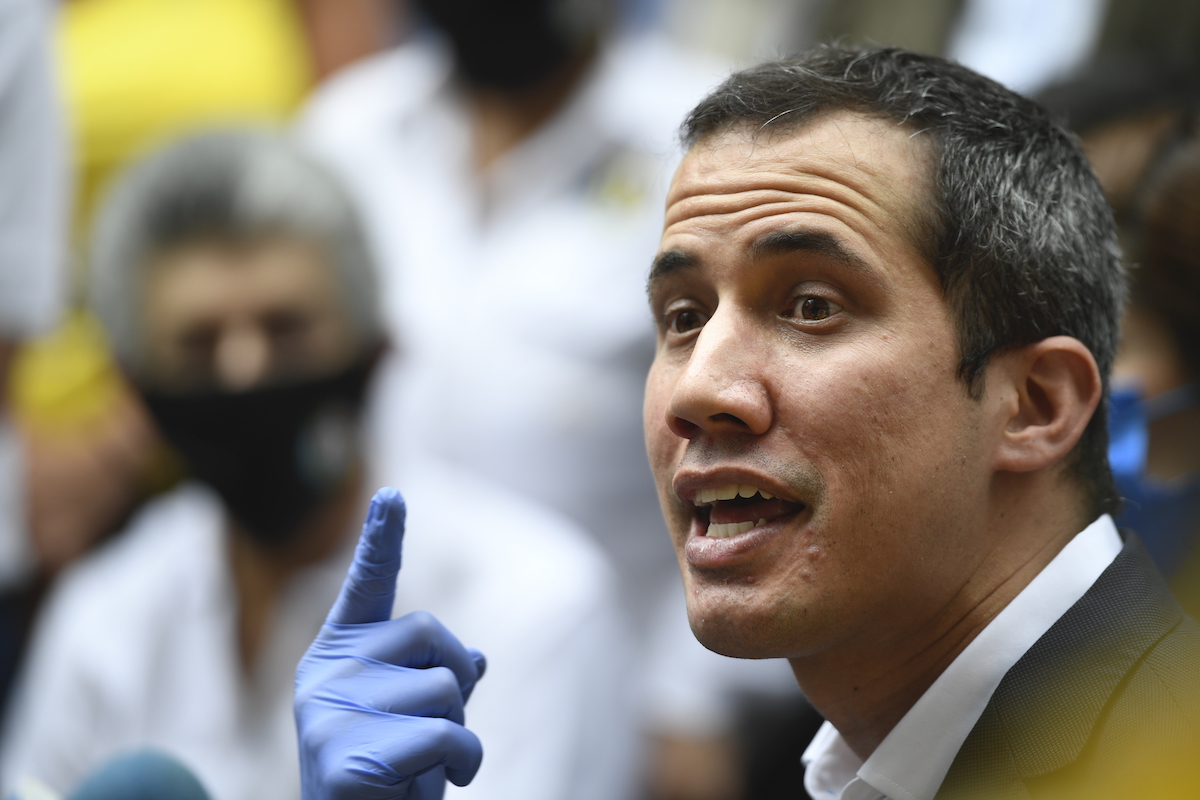

Venezuelan opposition leader Juan Guaidó speaks upon his arrival to the headquarters of Democratic Action political party in Caracas, Venezuela, Wednesday, June 17, 2020, the day after Venezuela’s Supreme Court ordered its takeover ahead of parliamentary elections expected this year. (AP Photo/Matías Delacroix)
By FABIOLA SÁNCHEZ and CHRISTINE ARMARIO, Associated Press
CARACAS, Venezuela (AP) — Venezuela’s government-stacked Supreme Court on Tuesday ordered the takeover of opposition leader Juan Guaidó’s political party, the latest in a series of moves against President Nicolás Maduro’s critics ahead of upcoming legislative elections.
The decision removes Leopoldo López, the founder of Popular Will, as the party’s official leader and names in his place a lawmaker kicked out of the organization last year amid accusations he’d conspired with Maduro allies.
“Our fight continues on strongly,” López said in a series of tweets after the ruling. “In spite of all the danger and to the ultimate consequences.”
Nuestra lucha sigue de manera firme, a pesar de los peligros y hasta las últimas consecuencias. Desde El Nula hasta Tucupita, desde Caracas hasta Puerto Ayacucho, desde la cárcel o el exilio, ningún activista de Voluntad Popular descansará hasta ver libre a Venezuela
— Leopoldo López (@leopoldolopez) July 7, 2020
The decision comes less than a month after Venezuela’s Supreme Court ordered the takeover of two other influential opposition parties and as Guaidó’s anti-Maduro movement has dipped in popularity and struggles to regain steam.
A new National Electoral Council —still tilted in Maduro’s favor— is pressing forward with plans to hold legislative elections in early December. The National Assembly is the only branch of government still dominated by the opposition. Many Maduro critics have indicated they will not participate, in belief the election will be rigged.
The electoral body recently released a list of the parties that will be permitted to run in the upcoming election—Popular Will not among them. The chief prosecutor, also a Maduro ally, has been urging the Supreme Court to declare the party a terrorist organization.
“They want to make it quite clear that Guaidó is history,” said Phil Gunson, a Caracas-based analyst for the International Crisis Group.
Venezuela’s opposition has floundered since drawing hundreds of thousands to the streets last year amidst widespread outrage over the oil-rich nation’s economic decline, mass migration and Maduro’s tightening grip on power.
The socialist leader was re-elected in 2018 in a vote criticized by the opposition and much of the international community as unfair. Several of the opposition’s most popular leaders were barred from running. Despite Maduro’s low approval rating, he has managed to cling to power and protests have largely fizzled, a result of a growing sense of apathy, disillusionment with the opposition and fears of retribution.
López, Guaidó’s political mentor, was detained in 2014 for leading anti-government protests and sentenced to nearly 14 years in jail. In 2017, he was granted permission to serve the remainder of his sentence under house arrest. Last year, security forces adhering to an order from Guaidó released Lopez, and shortly thereafter he appeared on a bridge with troops calling on the military to rise against Maduro.
The insurrection attempt failed and López sought refuge in the Spanish Embassy, where he has remained for over a year since.
The government is likely to use the takeover of Popular Will and other opposition parties to provide a façade of democratic participation in the upcoming elections, Gunson said. Though the party’s registration was revoked, the all-powerful Constitutional Assembly could pave the way for its inclusion in the upcoming elections with the newly appointed leadership.
Seeing the traditional opposition parties on the ballot —despite being filled with Maduro-aligned minority factions— could give voters without access to information a misleading idea of whom they are actually casting a ballot for.
“You may well be confused into voting for the party you always voted for,” Gunson said.
The new Supreme Court-appointed leader of Popular Will is José Gregorio Noriega, one of several former members of the country’s mainstream opposition accused of taking bribes from Maduro allies with the aim of debilitating Guaidó last year.
Noriega, who denied the bribe allegation, filed a complaint with the Supreme Court, saying his constitutional rights had been violated by being kicked out of Popular Will.
Guaidó remains recognized by the U.S. and over 50 other nations as Venezuela’s rightful president, though that could be called into question if he does not participate in the election and his term expires. He is a member of Popular Will, and became president of the National Assembly in part because of his party affiliation.
López seemed to indicate Tuesday that he will stand against opposition participation in the upcoming December legislative vote.
“You can’t fight for free elections, participating in fraudulent and farcical votes organized by those looking to silence the people,” he wrote on Twitter. “Our party, loyal to the fight for Venezuela’s freedom, does not obey dictatorial impositions.”
Nuestra postura es que no se puede luchar por elecciones libres, participando en fraudes y farsas electorales organizadas por quienes buscan callar la voluntad del pueblo. Nuestro partido, fiel a la lucha por la libertad de Venezuela, no obedece imposiciones dictatoriales
— Leopoldo López (@leopoldolopez) July 7, 2020
***
Armario reported from Bogotá, Colombia.


